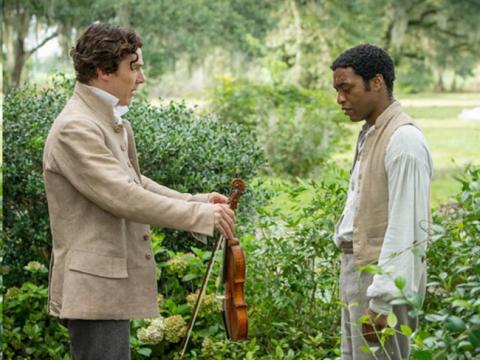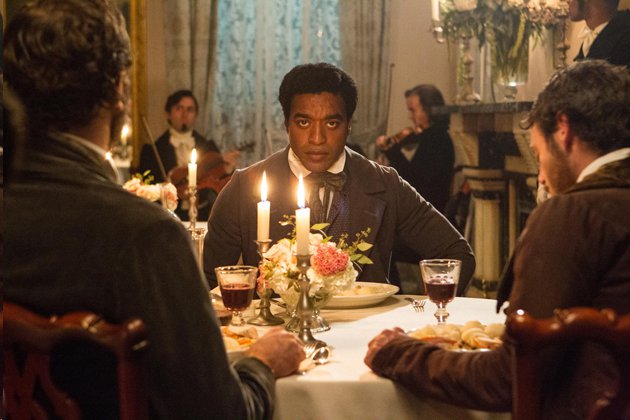Hollywood Finally Catches Up With History

From the Root and our content partner, New America Media:
Steve McQueen's masterful 12 Years a Slave has already changed history in two major ways: It is the first Hollywood-backed movie on slavery directed by a black filmmaker, and based on Solomon Northup's 1853 oral account, it is the first film ever based on an actual slave narrative.
While the former results from the dearth of black directors who are able to get historical dramas funded and distributed by major studios, the latter reveals a more troubling truth. Despite the fact that nearly 200 narratives were published in the United States and England between 1760 and 1947, filmmakers have almost completely ignored these materials.
The result has been a rigid typecasting of enslaved African Americans as either sambos or superheroes in Hollywood's most successful films on slavery. In the 1939 box-office smash Gone With the Wind, slave characters like Prissy, Mammy and Uncle Peter humorously submit to their mistress. Inversely, Quentin Tarantino's hugely successful Django Unchained has both the butler Stephen, who gladly serves his master, and the slave protagonist, Django, who singlehandedly overthrows an entire plantation.
Missing from these flat representations are the complexities and contradictions of plantation life that dominated the slave narratives and actually enabled most enslaved African Americans to survive and, as in the case of Solomon Northrop, outlive their oppression.
That is, until now.
While the turn by 12 Years A Slave to the slave narrative might be new, it lags historians and other artistic mediums by more than 40 years. Politicized by the changing racial climate of the 1960s, American historians began to reject the then widely accepted thesis of historian Stanley Elkins' 1959 book Slavery, which purported that the institution was so psychologically infantilizing to African Americans, they developed dependent "sambo" personality types.
Believing that Elkins' thesis willfully ignored the testimonies of former slaves, historians began challenging the longstanding assumption that plantation owners' records provided the most accurate and objective accounts. By 1972, the first two books that consistently used slave narratives as primary sources -- John Blassingame's The Slave Community and George Rawick's From Sundown to Sunup -- were published and changed the study of slavery forever.
At the same time, African-American writers like Octavia Butler, Barbara Chase-Riboud and Ishmael Reed began adapting the first-person slave-narrative form in their novels. Its impact on the literary world was so vast that a new genre -- the neo-slave narrative -- was born, while the slave narrative continued to serve as inspiration for later works by African-American artists and performers as diverse as choreographer Bill T. Jones, visual artists Glenn Ligon and Kara Walker, jazz musician Wynton Marsalis and most famously for Toni Morrison's Pulitzer-prize winning novel Beloved.

Why, then, has Hollywood taken so long to catch up? Part of the problem is that unlike the plethora of movies on other historical atrocities such as the Holocaust, there are so few films on American slavery. But unlike movies on the Holocaust, which allow American audiences to understand past trauma and mass violence as a phenomenon that happens outside the U.S., films on slavery reveal the paradox that continues to haunt us -- the peculiar marriage of racism and freedom upon which the nation was founded.
Our cinematic amnesia about slavery has also come with a huge cost: The most popular films feature white characters who always outsize slave characters, like the sympathetic slave owner (Scarlett O'Hara), an antislavery statesman (Amistad's John Quincy Adams) or a charismatic sidekick (Dr. King Schultz of Django).
This preoccupation with white protagonists, which also dominates Hollywood's treatment of Native Americans (think Dances With Wolves), does so by softening the reality of slavery and purposely denying the lives and opinions of those who endured it the most.
Twelve Years a Slave, on the other hand, begins to do for contemporary Americans what the slave narratives did on behalf of the abolitionists. It rips the veil off the horrors of slavery, while humanizing the enslaved African Americans. It does not portray Northup (brilliantly played by Chiwetel Ejiofor) as either an accomplice to or the sole avenger of slavery. Rather, it zooms in on the ordinary violence of his life, making him a three-dimensional character who simultaneously accommodates and resists his subjugation in order to simply remain alive.
It also shows slavery as America's ultimate irony. It was both a mundane and menacing institution that produced pathological slaveholders (intensely played by Michael Fassbender and Sarah Paulson) who derived their pleasure and wealth from the psychological and physical torture of slaves. In response, the majority of enslaved African Americans had few options: a slow acceptance of their fate, small forms of resistance, rare escape or death.
Through the characters Eliza (a passionate Adepero Oduye) and Patsey (a poignant Lupita Nyong'o), we are also reminded of Harriet Jacobs' famous words in the slave narrative Incidents in the Life of a Slave Girl: "Slavery is terrible for men, but it is far more terrible for women."
And while 12 Years a Slave clearly builds on the work of a preceding generation of artists and historians, it has also cleared a space of its own. By privileging the testimonies and voices of the slaves themselves, it gives us a new cinematic story of slavery as exceptionally violent and quintessentially American.
Author Bio:
Salamishah Tillet is an associate professor of English and Africana studies at the University of Pennsylvania. She is the author of Sites of Slavery: Citizenship, Racial Democracy, and the Post-Civil Rights Imagination and the co-founder of A Long Walk Home, a nonprofit organization that uses art to end violence against girls and women.






























































































































































































































































































































